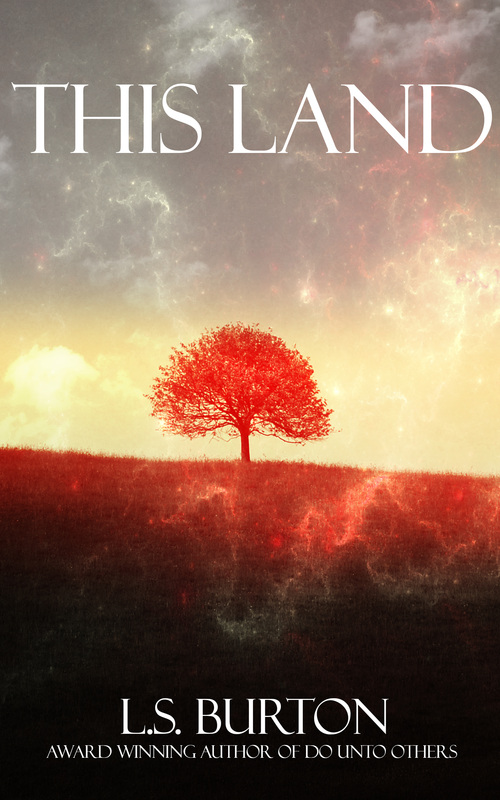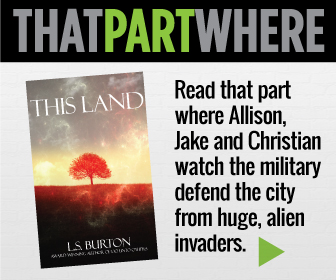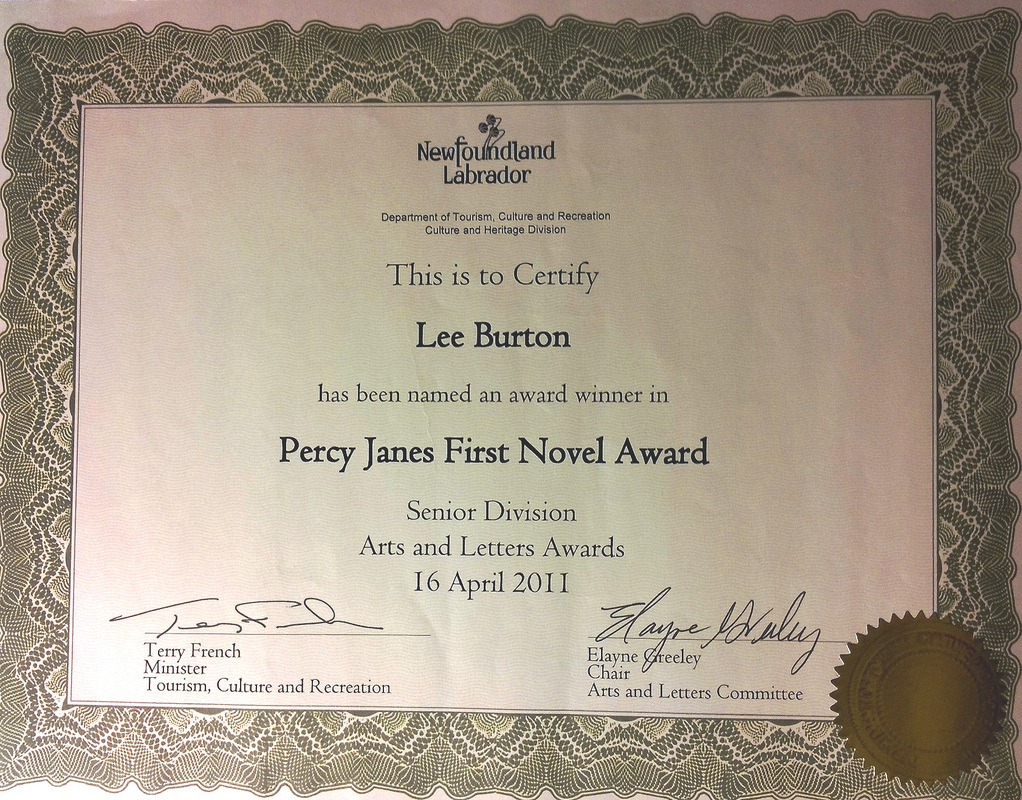|
In the end I chose not to use the prologue for the first book, but I'm confident it'll make an appearance in the second. THIS LAND That Ribbon of Highway Prologue 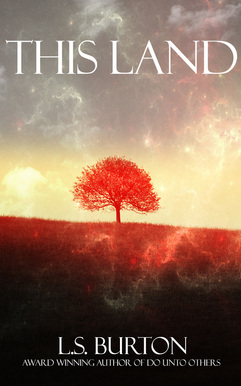 The slow fires of eternity burned within them, these three grandfathers of stars, these eggs of civilizations, as through the ageless black they lumbered, ever faithful to the instructions of their masters, given so many eons ago: Proliferate. Prepare. Make way for us. Now these dark leviathans were awakening, beginning to feel the tickle of the nearby yellow sun, growing as a distant hole in the black tapestry of the universe. As they drew nearer, they tasted the flavor of its solar breath over their bodies and found it a refined meal; the star had aged well, to a warm and gentle vintage, since their last visit, and they noted the change with mechanical pleasure: the conditions aligned, their calculations were in agreement; between them they shared a pleasing congruity. Yet something was not as it should be. Though the yellow sun had become the fertile garden they’d expected, the seed of the second planet was not as they’d left it. From afar they detected a surfeit of oxygen and nitrogen; the planet was awash with hydrogen, carbon. Incongruity. Misalignment. The conditions were not in agreement. They awakened more completely, expanding the wings of their consciousnesses wider to swish about these blues and greens and browns they were tasting from the planet in the light of this refined sun. Only, as the cells within them awakened from the cold hibernation of eons, one of the travelers awakened in error. With its kin, it tasted the blues and browns and greens and, like them, came to the pleasure of alignment between their conclusions. Life. However, during their long sleep since the last star, many thousands of years before, portions of its instructions from their creators had been forgotten. In those places where it reached deep inside itself for guidance, it felt only dim memory, half-remembered creeds. Life. With this new congruence of unconformity, its two kin shouldered the wings of their consciousnesses once more, and powered down despite this strange taint to their meal. Misalignment, yes, but, as per their instructions, they were not to create life through extinction, as, above all, their masters had feared making entreaties to the void only to hear the echoes of themselves coming back to them out of the darkness, pips of insignificance in a long, lonely universe. They peered far ahead through the swells and tides of gravity around the outer gas planets, and the clockwork disturbances of comets and unclaimed tumbling stones, and with the most imperceptible adjustment, angled toward the yellow sun, ever to move through the universe, ever to sleep between the cradles of the stars, fulfilling the instructions of their masters, wherever they might be. To aid their exit out of the system, they would bask in the yellow star’s generous feast briefly, and use its gravity to boost them out into the silence of cold oblivion once more, where they would again shutter their minds and wait until they were next needed. Except … in their adjustments they suffered in surprise. Their kin had not turned with them. It was spreading the wings of its consciousness further and had begun to slow. Asymmetry. Disfluence. Assessments indicated it was manoeuvring to fulfill their primary initiatives. It would proliferate, it would prepare, it would make way for their masters, and it would protect what it had wrought. If the burst of signals the two ancient leviathans sent to the breakaway traveler could be translated as words, they would be read as: Come with us. Come with us. Come with us. Come with us. Come with us…. And if machines could be said to contain sadness, as the signals gained longer intervals due to the burgeoning distance between them, it could also be said that they understood the futility of their cry across the darkness, because their signals weakened in strength as the distance compounded but they continued to plead with their kin nonetheless, as if the machines could also understand hope, could also comprehend desperation and loss. Originally they had numbered five, but two of their kind had faded in the vastness between the stars. The first was simply not alongside upon awakening at one of their destinations — how long ago, they could barely remember. The other had angled up and out of the galactic plane, slowly rising out of the cone of their experience. For centuries the three had hailed it, and it had replied over increments of thousands of years — still here … still here … still here … until it no longer was and the expanse of space sounded like stars huffing with fire and the cold tinkle of dust over dead rocks; the ether hid no words for them anymore. So, as the breakaway traveler settled in comfortably around the malappropriate planet, its two companions, having slung around the sun to bolster their escape velocity out of the system, sent a final, strong entreaty to their ancient kin; and when their impassioned plea was ignored, they sent no more signals, though they would still be within range for decades, as if the machines could also understand separation, inevitability, acceptance. The three had become two. The remaining traveler turned its attention to the planet slowly heaving beneath it — breathing with life, misalignment — and spread the wings of its consciousness to its fullest capacity, content in the congruence of purpose. The equivalent of long-unused limbs came to life and it stretched and scanned, revelling in its completeness, and made itself ready for the coming execution of arranging this land to alignment. It would propagate. It would prepare. It would make way. But it was not to … It was not to … It was not to … But it was not … not to … It was … not to … to … ?  Click for description page. Pardon the roughness. I'm jumping the proverbial gun a little by posting. Hope you enjoy. The last fingers of the morning fog were slinking away, little waves collapsing on the shore like exhausted swimmers. Hunkered down behind the fishing boat, Stephen knew the longer he stayed near the dock, the deeper the acrid sting of the brine would burrow into his nostrils. He’d taste it all night, even in his sleep, and probably have dreams about stinking seaweed dragging him into the ocean. It was times like these that tested Stephen’s understanding of how to be a good priest of Banyon. As he saw it, he could put his trust in his judgement of people, that they were rational and straightforward, or he could put his trust in how the world worked: one day followed the next — tomorrow would be much the same as today. Because therein lay the problem. The day before had derailed spectacularly and had come crashing into this morning. Acolyte Daniel was still peeping over the edge of the boat, scanning the houses and the fish-drying rooms. If someone happened along then to see them, they’d look foolish. “What do you think, Daniel? Daniel was as sure as ever. “I don’t see anything. No, there’s definitely nothing there.” “No, about all of this. What do you think?” “Oh. No. There’s definitely no such thing as monsters.” Monsters, thought Stephen. Someone had finally said the word. Over the houses, Stephen could see the plume of pale orange rising from the hillside. Some of the men claimed it was a kind of smoke coming from a strange thing up in the woods. Like a big pimple just ... just sprung up out of the ground. “It was a northern rake,” said Daniel, “drifted down with the ice. That happens sometimes. The current brings them right past here. I’d be scared of a rake too. They get big. Have teeth the size of my fingers. They can take down gannocks over four times their size and rip them to shreds before they eat them. They have three stomachs, see....” That was the last Stephen heard before he tuned Daniel out and looked out over the glittering ocean. He wasn’t so sure the townspeople had seen a northern rake. At heart, he wanted to dismiss everything they had said — wave away all the strange talk about the animal, pat the dust off his robes, and run his errands the way he would normally; life wants to go on like that. But the people who’d come running to the monastery were hardy folk, faces carved by scouring winds, hands sculpted by pulling wet ropes out of the ocean, by pulverizing thick bread, by the hilts of fish-gutting knives. Not people to tell tall tales: people who would know a northern rake if one drifted in on a stray piece of pack-ice. Surely, half of them had seen it happen before, and had probably eaten rake-steaks for days afterward. Monsters. Banyon himself had only to believe that he wouldn’t die from thirst, that water would erupt from the bare stone about him. Even he hadn’t had to wrap his mind around monsters in a quaint place like Bay Banyon. Normally, the worst monsters found in town were the ugly clawfish the nets sometimes trawled up, with faces like fistfuls of nails. Too late in the season and they tasted terrible, and tended to give Stephen pungent gas. “Easy for you to say,” said Stephen, cutting into Daniel’s lecture arbitrarily, “your room is up near the tower. I’m down by the hall. All night people were wailing and pulling their hair out. I might have closed my eyes for a couple hours, maybe two. Up in the tower, see, it’s quiet. Down near the hall where I am, last night it sounded like a circus was going on in there. Now, it’s not so bad normally—” “People see all kinds of things that don’t really exist. This is a small town. People here were probably still seeing sea maidens and tree people until recently. They see a northern rake and they panic.” Sobbing and crying had crept stone to stone across the ancient quiet of Banyon hall, twenty people camped on the sacred steps. Few of them had brought food. Some of the women still holding their knitting needles. The men with their high rubber boots on their feet trampling the vegetables to relieve themselves in the corner of the yard when Mrs. Johnson took too long in the communal water room. Young Mrs. Cole had hardly said a word the past two days. She’d just curled up on the stone steps of Banyon’s chamber and talked quietly to herself. Talking to her absent husband, someone had said. Where her young daughter was, nobody would say. Stephen hated hearing her crying, and Old grumpy Ben Terra, gnashing his gums together and grinning at everyone, seemed determined to make the ordeal worse for everybody. Every so often, when the room had quietened, he’d smack his hands together loudly and yell, “Shooped up like a great blot of steam! Clamped down upon like two hands clapping in that great mouth of the beast, then SHOOP, there he went!” In the quiet of the great stone chamber, his hands clapping reverberated inside the ears like gunshots. The women scolded him. These gentle mothers of Bay Banyon with their ankle-length dresses and flower-print aprons had eyes like wild beasts when needed. He was scaring the children, they said. A man of his years should have better sense. But Old Ben Terra had been ignored in town too long to keep himself quiet. Before long he’d raise a ruckus again. Maybe not of the same sort, yet trouble nonetheless. What men weren’t out with their rifles only looked at their feet, not knowing their place. Stephen picked a yellow peeling of paint off the boat with his finger and shifted on the loose shore stones. His knees were starting to ache; the soles of his shoes were too thin and his feet could feel every lump. Daniel stood up and stretched his neck to look further. “It doesn’t exist … what they described. And it doesn’t make sense. It’s only about four hundred paces to the store. The front door is open. The sign’s still on it, even.” “That may be true, but I’m not so sure that—” “You got your robes on, Stephen. Trust in Banyon, right?” Stephen didn’t like the condescending tone in that. Daniel had missed the point of being a priest of Banyon altogether. It didn’t make him live with faith in the optimal outcome, it made him cocky and restless. “Okay ... but Banyon wasn’t stupid, Daniel. Seems to me that’s why the monastery’s on a peninsula, and there’s fifteen foot high walls around it.” Daniel scoffed. “To keep the gardens from being attacked, maybe. The walls by the road don’t even go anywhere.” “Well, they’re probably symbolic or something.” The waves hissed down at the beach and the stones clattered, reluctant to be drawn down by the white fingers of the surf. “See, said Daniel,” holding his hand to his ear, “if there were a northern rake anywhere near here, we’d have heard it scraping its front claws together by now….” Stephen stood slowly and stretched his legs, sliding his toes around against the rocks. He could feel his knees and ankles popping. Probably be crippled by fifty, he always said. It felt good to stand, but that orange column rising from the hill looked to be blowing towards them, and he felt exposed strolling along as if everything was normal. “Fine, you go on,” he said, “you be the brave one. I hope you don’t mind if I hang back a bit and stick close to the houses. I don’t got the young danglers that you got.” Quiet. That was true. An assault of quiet. The wind was waving in the far trees, the branches bowing their heads, and Stephen could hear dead leaves scraping across the pavement somewhere, and the tinkle of tiny rocks against a metal grate. Usually there’d be a crowd of men down by the dock, mending nets and spitting, gregarious, with thick fingers and impenetrable mumbled accents. He could ignore them until they weren’t there. Then their absence made him nervous. Back at the monastery, he’d counted nearly twenty people before their milling had ruined his tally, but that left nearly three times that many unaccounted for. Down the road all the doors were closed, the houses quiet. Where was the clatter of dishes being put away after breakfast, the squeak of clothes being fed out to a backyard line? And now that he thought about it, no whistle fish were singing down by the beach. Nor was there a single cheep to be heard from a gray-wing overhead. Inside every house, he saw only pictures and chairs and dishes, sewing machines and pipes on windowsills. These were dolls’ houses. He wanted somebody, anybody, to be around, and he wanted them to come ambling around a corner carrying their potatoes in an old shirt, not to be found hiding in a closet, or running for their life. If this was all a joke, he was tired of it. He decided he would not call out, and wouldn’t mention the quiet to Daniel either. The boy would start yodeling over the rooftops with his next breath. He’d been glad to take Daniel and escape the Banyoners invading his home. Another hour tending to the braying of Mrs. Johnson and they’d have been prying his hands off her throat. The people of Bay Banyon had never been friends to him, but he found himself wishing for a sidelong glance from a window, a sneer from an open upstairs door. He didn’t like being nervous, and wanted to be at home, hoeing in the garden and making repairs to their crumbling monastery; he missed the tedium of his morning rituals. An orange stain roughly two arm-spans wide was slowly running off the side of the outside wall of the store. Some of it had apparently washed away with the rain the night before, but it looked to have soaked into the boards underneath. Shooped up like a great blot of steam! “This is going to take some paint,” said Daniel. He plowed his finger through the orange sheen and it looked viscous and slippery. Daniel sniffed it and coughed immediately. “Ugh, that smells like a jeck’s udder.” Not wanting to wipe it on his pants, he wiped his finger crisscross against the doorframe. SHOOP! There he went. Gone! “Ahh, my finger still smells!” “Not so loud.” Stephen couldn’t get the sound of grumpy old Ben Terra clapping out of his head. Gone! Just like that. Gone! Clap! Gone! |
L.S. Burton
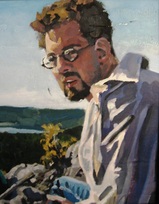 Farewell, third person bio. Farewell, third person bio.
Lee Burton doesn't have cats or kids, but he does have a lot of books, a couple of mugs he thinks are really fantastic, and a good pair of shoes which haven't fallen apart yet despite his best efforts to murder them with kilometers.
Burton has written almost six books. Almost six as some are still scantily clad in their respective drawers. Each of them had their own goals and were written differently, and he is very fond of them all -- except perhaps for his first attempt at a novel, which remains a travesty. That one he keeps locked in a dark basement and feeds it fish heads. In 2011, Burton won the Percy Janes Award for Best Unpublished First Novel in the Newfoundland and Labrador Arts and Letters Competition for his novel Raw Flesh in the Rising. And just recently, in the fall of 2013, Burton published his first science-fiction novel, THIS LAND, about which he boasts constantly. Available at Amazon
StoreNow Free
|
